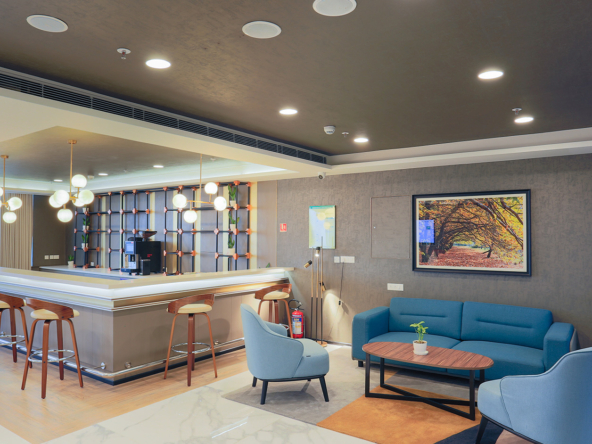Commercial real estate investment offers lucrative opportunities for investors, particularly in two popular segments: retail shops vs office spaces. Each of these asset classes has its own unique set of benefits and challenges. In this blog, we’ll explore a detailed comparative analysis between investing in retail shops and office spaces, providing insights, examples, and data-driven insights.
1. ROI Potential: High Returns vs. Stability
Retail Shops: Retail spaces are known for offering higher rental yields compared to office spaces. In prime locations like high streets or shopping malls, retail shops can generate annual returns ranging from 8% to 12%. However, this potential for high returns also comes with volatility, driven by market conditions, consumer trends, and the evolving retail landscape, particularly in the face of competition from e-commerce.
Office Spaces: On the other hand, office spaces tend to provide more stable rental yields, generally in the range of 6% to 9% annually. This is especially true in central business districts (CBDs) where long-term leases with corporate tenants are common. While the returns may be lower than retail, the steady income stream and long-term lease agreements offer stability that many investors value.
A retail shop in Connaught Place, Delhi, might yield higher returns than an office space in Gurugram. However, the office space might secure a long-term corporate tenant, offering steady cash flow with less risk.
2. Market Demand Trends: Consumer-Driven vs. Business-Driven
Retail Shops: The demand for retail spaces is intricately tied to consumer spending and foot traffic. High-end brands, restaurants, and entertainment outlets tend to drive demand in popular retail hubs. However, the retail sector is highly sensitive to market changes, such as the rise of online shopping, which can impact physical retail space demand.
Office Spaces: The demand for office spaces depends on economic growth, corporate expansion, and changes in work culture. Post-pandemic, many companies have adopted hybrid working models, reducing the need for large office spaces. However, there has been an increase in demand for flexible office spaces, particularly in metro cities.
During the COVID-19 pandemic, many retail outlets experienced a drop in demand, whereas flexible office spaces in Bengaluru saw increased demand as companies adjusted to hybrid work environments.

3. Vacancy Rates: A Key Consideration for Investors
Retail Shops: Vacancy rates in retail spaces tend to be higher, particularly in non-prime locations or secondary markets. This is due to fluctuating foot traffic and changes in consumer behavior. Retail spaces in smaller malls or less popular locations can experience prolonged vacancies, which directly impacts an investor’s rental income.
Office Spaces: Office spaces, especially in established business hubs, generally have lower vacancy rates. Companies often sign long-term leases, ensuring steady occupancy and reducing the risk of vacancies.
Retail spaces in smaller malls may struggle with higher vacancy rates compared to prime office spaces in Noida Expressway, which cater to IT firms and other large corporations.
4. Capital Appreciation: Location Matters
Retail Shops: Retail properties in high-demand areas can experience significant capital appreciation. Locations like popular high streets, established retail corridors, or well-performing malls tend to see the most appreciation. However, appreciation can be highly location-dependent, and retail spaces in less successful areas may struggle to increase in value.
Office Spaces: Office spaces typically experience steady capital appreciation, particularly in established business districts. Locations benefiting from infrastructure development, such as the Noida-Greater Noida Expressway, can see strong appreciation over time.
A retail shop in a high-demand area like Colaba, Mumbai, may see higher capital appreciation than an office space in a suburban business park, but this comes with higher risk due to market fluctuations.
5. Leasing and Management Complexity: Active vs. Passive
Retail Shops: Leasing retail spaces often requires more active management, as tenants may frequently change due to varying business success. For landlords with multiple retail tenants, managing these relationships can be challenging, especially when dealing with short-term leases and turnover.
Office Spaces: Office spaces usually involve long-term leases, which provide stability. However, the demand for modern amenities and flexible workspaces can increase management complexity, especially if the space is used by multiple tenants.
A retail shop in a mall may require more frequent lease negotiations, while an office tenant in a corporate park might remain for several years, requiring minimal intervention.
6. Risk Factors: Volatility vs. Stability
Retail Shops: Investing in retail properties carries higher risks due to the ever-changing retail landscape, competition from online platforms, and the potential for high tenant turnover. Location is a significant factor—retail spaces in less desirable areas can remain vacant for extended periods, reducing returns.
Office Spaces: Office space investments are generally considered lower risk, particularly in established business hubs. However, risks can emerge from macroeconomic downturns, changes in corporate needs (such as a shift to remote work), and oversupply in certain areas.
A retail space in a newly developed mall may remain vacant if the mall fails to attract sufficient foot traffic, while an office space in a prime IT hub like Sector 62, Noida, would likely have more stable occupancy.
Weighing the Options
Investing in retail shops vs office spaces requires a careful evaluation of the trade-offs between higher potential returns and increased risk in retail, versus the stability and longer-term tenants found in office spaces. Investors must assess their risk tolerance, market knowledge, and long-term goals to make the right choice.




